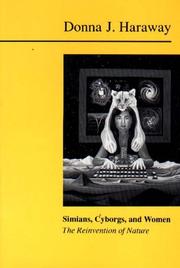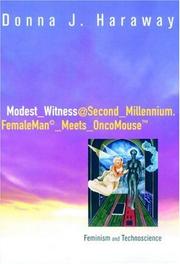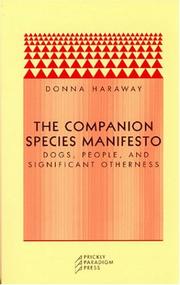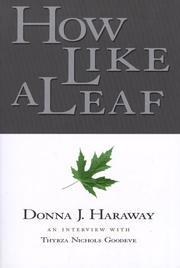| Listing 1 - 10 of 14 | << page >> |
Sort by
|

ISBN: 1853431397 9781853431395 Year: 1991 Publisher: London : Free Association Books,
Abstract | Keywords | Export | Availability | Bookmark
 Loading...
Loading...Choose an application
- Reference Manager
- EndNote
- RefWorks (Direct export to RefWorks)
Philosophy of nature --- Sociology --- Human ecology. Social biology --- Biology. --- Feminism. --- #KVHA:Methodologie --- #KVHA:Research --- #KVHA:Wetenschappelijk onderzoek --- Philosophy and psychology of culture --- Sociology of the family. Sociology of sexuality --- Biology --- Animal ethology and ecology. Sociobiology --- Artificial intelligence. Robotics. Simulation. Graphics --- Feminist criticism --- Postmodernism --- Book --- Cyber-feminism --- Cyborgs

ISBN: 9780816650453 0816650454 9780816650460 0816650462 0816654034 9780816654031 Year: 2008 Volume: 3 Publisher: Minneapolis : University of Minnesota Press,
Abstract | Keywords | Export | Availability | Bookmark
 Loading...
Loading...Choose an application
- Reference Manager
- EndNote
- RefWorks (Direct export to RefWorks)
" In 2006, about 69 million U.S. households had pets, giving homes to around 73.9 million dogs, 90.5 million cats, and 16.6 million birds, and spending more than 38 billion dollars on companion animals. As never before in history, our pets are truly members of the family. But the notion of companion species knotted from human beings, animals and other organisms, landscapes, and technologies includes much more than companion animals. In When Species Meet, Donna J. Haraway digs into this larger phenomenon to contemplate the interactions of humans with many kinds of critters, especially with those called domestic. At the heart of the book are her experiences in agility training with her dogs Cayenne and Roland, but Haraway's vision here also encompasses wolves, chickens, cats, baboons, sheep, microorganisms, and whales wearing video cameras. From designer pets to lab animals to trained therapy dogs, she deftly explores philosophical, cultural, and biological aspects of animal human encounters. In this deeply personal yet intellectually groundbreaking work, Haraway develops the idea of companion species, those who meet and break bread together but not without some indigestion. ?A great deal is at stake in such meetings, she writes, and outcomes are not guaranteed. There is no assured happy or unhappy ending-socially, ecologically, or scientifically. There is only the chance for getting on together with some grace. Ultimately, she finds that respect, curiosity, and knowledge spring from animal human associations and work powerfully against ideas about human exceptionalism."--Site web de l'éditeur
Human-animal relationships --- Human-animal relationships. --- 316.47 --- Animal-human relationships --- Animal-man relationships --- Animals and humans --- Human beings and animals --- Man-animal relationships --- Relationships, Human-animal --- Animals --- Sociale relaties --(sociologie) --- 316.47 Sociale relaties --(sociologie) --- Relations homme-animal --- Animals and civilization. --- Philosophy --- Philosophy and psychology of culture --- cultuurkritiek --- dieren --- huisdieren
Book
ISBN: 9780822362241 9780822362142 0822362147 0822362244 9780822373780 0822373785 Year: 2016 Publisher: Durham ; London : Duke University Press,
Abstract | Keywords | Export | Availability | Bookmark
 Loading...
Loading...Choose an application
- Reference Manager
- EndNote
- RefWorks (Direct export to RefWorks)
In the midst of spiraling ecological devastation, multispecies feminist theorist Donna J. Haraway offers provocative new ways to reconfigure our relations to the earth and all its inhabitants. She eschews referring to our current epoch as the Anthropocene, preferring to conceptualize it as what she calls the Chthulucene, as it more aptly and fully describes our epoch as one in which the human and nonhuman are inextricably linked in tentacular practices. The Chthulucene, Haraway explains, requires sym-poiesis, or making-with, rather than auto-poiesis, or self-making. Learning to stay with the trouble of living and dying together on a damaged earth will prove more conducive to the kind of thinking that would provide the means to building more livable futures. Theoretically and methodologically driven by the signifier SF-string figures, science fact, science fiction, speculative feminism, speculative fabulation, so far-Staying with the Trouble further cements Haraway's reputation as one of the most daring and original thinkers of our time.
Human-animal relationships. --- Human-plant relationships. --- Human ecology. --- Nature --- Effect of human beings on. --- Human-animal relationships --- Human-plant relationships --- Human ecology --- Effect of human beings on --- Anthropogenic effects on nature --- Ecological footprint --- Human beings --- Anthropogenic soils --- Ecology --- Environment, Human --- Human environment --- Ecological engineering --- Human geography --- Man and plants --- Man-plant relationships --- Plant-human relationships --- Plant-man relationships --- Plants and man --- Relationships, Human-plant --- Plants --- Botany, Economic --- Ethnobotany --- Synanthropic plants --- Animal-human relationships --- Animal-man relationships --- Animals and humans --- Human beings and animals --- Man-animal relationships --- Relationships, Human-animal --- Animals --- Social aspects --- Effect of environment on --- #SBIB:39A3 --- #SBIB:1H30 --- Antropologie: geschiedenis, theorie, wetenschap (incl. grondleggers van de antropologie als wetenschap) --- Filosofie van de mens, wijsgerige antropologie --- Relations homme-animal --- Relations homme-plante --- Écologie humaine --- Effets de l'homme --- Philosophy and psychology of culture --- Sociology of culture --- Haraway, Donna --- Relations homme-animal. --- Relations homme-plante. --- Écologie humaine. --- Effets de l'homme. --- UmU kursbok --- Rapport culture-nature --- Anthropologie --- Nature - Effect of human beings on --- Feminism --- Science fiction --- Book --- Epistemology --- Êtres humains --- Influence sur la nature --- Écologie humaine.

ISBN: 0415912458 041591244X 9780415912457 Year: 1997 Publisher: New York : Routledge,
Abstract | Keywords | Export | Availability | Bookmark
 Loading...
Loading...Choose an application
- Reference Manager
- EndNote
- RefWorks (Direct export to RefWorks)
'Modest_Witness@Second_Millennium. FemaleMan_Meets_OncoMouse' explores the roles of stories, figures, dreams, theories, facts, delusions, advertising, institutions, economic arrangements, publishing practices, scientific advances, and politics in twentieth- century technoscience. The book's title is an e-mail address. With it, Haraway locates herself and her readers in a sprawling net of associations more far-flung than the Internet. The address is not a cozy home. There is no innocent place to stand in the world where the book's author figure, FemaleMan, encounters DuPont's controversial laboratory rodent, OncoMouse. Haraway sees the world of contemporary technoscience as a drama. Information sciences and life sciences are at the center of the dramatic action. Scenes are set in landscapes where maps of human genetic differences are stored in databases, racialized bodies are reconfigured by morphing for photographs in popular magazines, and transgenic mice important to breast cancerresearch are patented intellectual property. The actors are many, and not all are human. Beginning with the Modest Witness, the key figure in the Science Revolution, Haraway shows us the trouble lurking in race and gender- marked practices for attesting to matters of fact. In later scenes, Haraway explores the kinship relations among the many cyborg creatures produced in the late twentieth-century--in nuclear research, genetic engineering, reproductive technologies, computer-mediated representational practices, and mutations in biological approaches to "race."
Computers and civilization. --- Science --- Technology --- Social aspects. --- Philosophy and psychology of culture --- Political philosophy. Social philosophy --- Philosophy of science --- anno 1900-1999 --- Computers and civilization --- Feminist criticism --- Feminist theory --- 315.1 --- communicatie --- cybernetica --- feminisme --- wetenschapsfilosofie --- Science and society --- Sociology of science --- Feminism --- Feminist philosophy --- Feminist sociology --- Theory of feminism --- Criticism --- Civilization and computers --- Civilization --- Social aspects --- sociale vraagstukken, vrouwenemancipatie --- Philosophy --- Feminist theory. --- Feminist criticism. --- Théorie féministe --- Technologie --- Sciences --- Ordinateurs et civilisation --- Aspect social --- Technology - Social aspects. --- Science - Social aspects. --- Théorie féministe. --- Aspect social. --- Race --- Gender --- Genetics --- Theory --- Internet --- Exact sciences --- Book --- Cyborgs

ISBN: 0971757585 9780971757585 Year: 2003 Publisher: Chicago : Prickly Paradigm Press,
Abstract | Keywords | Export | Availability | Bookmark
 Loading...
Loading...Choose an application
- Reference Manager
- EndNote
- RefWorks (Direct export to RefWorks)
Zoology --- Sociology of the family. Sociology of sexuality --- Dogs Psychology --- Dog owners --- Dogs --- Human behavior. --- Human-animal relationships. --- Psychology. --- Psychological aspects. --- Comportement humain --- Relations homme-animal --- Human-animal relationships --- Dogs - Psychological aspects --- Pet owners - Psychology --- Human behavior --- Dog owners - Psychology --- Propriétaires de chiens --- Psychologie --- Pet owners --- Relationships --- Theory --- Book --- Animals
Book
ISBN: 9782955573846 2955573841 Year: 2020 Publisher: Vaulx-en-Velin : Les éditions des mondes à faire,
Abstract | Keywords | Export | Availability | Bookmark
 Loading...
Loading...Choose an application
- Reference Manager
- EndNote
- RefWorks (Direct export to RefWorks)
Vivre avec le trouble, c'est entrer dans un monde étrange – le nôtre – où le temps, sorti de ses gonds, se retrouve ballotté dans un tourbillon de rencontres multispécifiques, d'appropriations violentes, de créations collectives sur fond de désastres climatiques. Un monde où les pensées émanent de symbiotes à corps multiples, visqueux et tentaculaires. Où la Terre est animée de forces aussi puissantes que terrifiantes. Où l'Humain, décomposé en humus, composte avec les autres espèces. Résolument impures, les histoires que raconte Donna Haraway mélangent allègrement les règnes, les époques, les registres, les matières et les disciplines – mais elles se situent toujours quelque part. Ce sont des histoires aventureuses, aussi denses de collaborations que de conflits, de terreurs que de possibles réjouissants. Ce sont des histoires de récupérations partielles, pour bien vivre et bien mourir sur une Terre abîmée.
Relations homme-animal. --- Écologie humaine. --- Nature --- Relations homme-plante. --- Effets de l'homme. --- Science --- Philosophy --- Écologie humaine. --- Human-animal relationships. --- Human-plant relationships. --- Human ecology. --- Effect of human beings on. --- Science - Philosophy --- Ecologie --- Animal --- Relations homme-animal --- Relations homme-plante --- Écologie humaine --- Êtres humains --- Influence sur la nature
Book
ISBN: 9782742772728 2742772723 Year: 2009 Publisher: Arles : [Paris] : Actes Sud, J. Chambon,
Abstract | Keywords | Export | Availability | Bookmark
 Loading...
Loading...Choose an application
- Reference Manager
- EndNote
- RefWorks (Direct export to RefWorks)
La plus célèbre théoricienne américaine du féminisme analyse à travers des travaux scientifiques qui vont de l'étude des primates à la recherche médicale en passant par la création des cyborgs, l'influence des présupposés culturels, et l'enracinement genré des sciences.
Sociobiologie. --- Critique féministe. --- Primates --- Comportement humain. --- Mœurs et comportement. --- Sociobiology --- Feminist criticism --- Human behavior --- Behavior --- Primates - Behavior --- Études sur les femmes --- Femmes et politique --- Femmes --- Féminisme --- Primatologie --- Sociobiologie --- Cyborgs --- Philosophie de la nature --- Travail
Book
ISBN: 9782081451483 2081451484 Year: 2019 Publisher: Paris : Climats,
Abstract | Keywords | Export | Availability | Bookmark
 Loading...
Loading...Choose an application
- Reference Manager
- EndNote
- RefWorks (Direct export to RefWorks)
Ce livre propose un pari audacieux : prendre notre relation avec les chiens au sérieux et apprendre "une éthique et une politique dévolues à la prolifération de relations avec des êtres autres qui comptent". Car la catégorie des espèces compagnes est bien plus vaste que celle des animaux de compagnie, elle inclut en effet le riz, les abeilles, la flore intestinale, les tulipes... "Vivre avec les animaux, investir leurs histoires et les nôtres, essayer de dire la vérité au sujet de ces relations, cohabiter au sein d'une histoire active : voilà la tâche des espèces compagnes." Pas de grands récits, donc, mais des histoires, dont le but est avant tout, dit Donna Haraway, de mettre des bâtons dans les roues au projet humain d'écrire seuls cette histoire. Des histoires d'amour, mais également de pouvoir, de conflits raciaux et d'idéologies coloniales, des histoires qui aident à élaborer des manières positives de vivre avec toutes les espèces qui sont apparues comme nous sur cette planète. Quelle est notre capacité humaine à construire des relations d'altérité qui ne soient pas marquées par des rapports de domination, mais par des relations de respect, d'affection, d'amour - sans qu'il s'agisse d'anthropocentrisme ou d'anthropomorphisme ? Voilà l'une des questions centrales que soulève ce livre devenu incontournable
Human-animal relationships --- Dogs --- Pet owners --- Human behavior --- Dog owners --- Psychological aspects --- Psychology --- Human behavior. --- Human-animal relationships. --- Comportement humain --- Relations homme-animal --- Relations homme-animal. --- Animaux domestiques. --- Chien --- Psychology. --- Aspect psychologique. --- Dressage. --- Philosophie --- Psychologie --- Dogs - Psychological aspects --- Pet owners - Psychology --- Dog owners - Psychology --- Animal --- Philosophie. --- Aspect parapsychique. --- Comportement animal. --- Propriétaires de chiens --- Chiens
Book
ISBN: 9780996635561 0996635564 Year: 2018 Volume: 56 Publisher: Chicago, IL : Prickly Paradigm Press,
Abstract | Keywords | Export | Availability | Bookmark
 Loading...
Loading...Choose an application
- Reference Manager
- EndNote
- RefWorks (Direct export to RefWorks)
As the planet's human numbers grow and environmental concerns proliferate, natural scientists, economists, and policy-makers are increasingly turning to new and old questions about families and kinship as matters of concern. From government programs designed to fight declining birth rates in Europe and East Asia, to controversial policies seeking to curb population growth in countries where birth rates remain high, to increasing income inequality transnationally, issues of reproduction introduce new and complicated moral and political quandaries. Making Kin Not Population ends the silence on these issues with essays from leading anti-racist, ecologically-concerned, feminist scholars. Though not always in accord, these contributors provide bold analyses of complex issues of intimacy and kinship, from reproductive justice to environmental justice, and from human and nonhuman genocides to new practices for making families and kin. This timely work offers vital proposals for forging innovative personal and public connections in the contemporary world.
Reproductive rights. --- Human ecology. --- Nature --- Human-animal relationships. --- Human-plant relationships. --- Effect of human beings on. --- Sociologie --- Philosophie politique --- Démographie --- Changement climatique --- Reproductive rights --- Human ecology --- Human-animal relationships --- Human-plant relationships --- Families --- Family assessment --- #SBIB:39A11 --- #SBIB:314H260 --- #SBIB:316.356.2H1110 --- Family history (Sociology) --- Man and plants --- Man-plant relationships --- Plant-human relationships --- Plant-man relationships --- Plants and man --- Relationships, Human-plant --- Human beings --- Plants --- Botany, Economic --- Ethnobotany --- Synanthropic plants --- Animal-human relationships --- Animal-man relationships --- Animals and humans --- Human beings and animals --- Man-animal relationships --- Relationships, Human-animal --- Animals --- Ecology --- Environment, Human --- Human environment --- Ecological engineering --- Human geography --- Reproductive freedom --- Sexual rights --- Abortion --- Birth control --- Contraception --- Human reproduction --- Involuntary sterilization --- Behavioral assessment --- Anthropogenic effects on nature --- Ecological footprint --- Anthropogenic soils --- Effect of human beings on --- History --- Antropologie : socio-politieke structuren en relaties --- Demografische kenmerken: algemeen --- Gezinssociologie: institutionele studies, algemeen --- Social aspects --- Effect of environment on --- Bevölkerungsentwicklung. --- Bevölkerungspolitik. --- Families. --- Family assessment. --- Geburtenregelung. --- Generationengerechtigkeit. --- History.

ISBN: 0415924030 9780415924030 Year: 2000 Publisher: London Routledge
Abstract | Keywords | Export | Availability | Bookmark
 Loading...
Loading...Choose an application
- Reference Manager
- EndNote
- RefWorks (Direct export to RefWorks)
Feminist criticism --- Feminist theory --- Human behavior --- Primates --- Sociobiology --- Criticism --- Feminism --- Feminist philosophy --- Feminist sociology --- Theory of feminism --- Biologism --- Human biology --- Human evolution --- Psychology, Comparative --- Social evolution --- Action, Human --- Behavior, Human --- Ethology --- Human action --- Human beings --- Physical anthropology --- Psychology --- Social sciences --- Behavior --- Philosophy --- Social aspects --- Haraway, Donna Jeanne --- Sociology of the family. Sociology of sexuality --- Animal ethology and ecology. Sociobiology --- Philosophy and psychology of culture --- Political philosophy. Social philosophy --- Philosophy of science --- Human ecology. Social biology --- Haraway, Donna --- Haraway, Donna J. --- Feminist theory. --- Feminist criticism. --- Sociobiology. --- Primates - Behavior. --- Human behavior. --- Interviews --- Theory --- Biology --- Book
| Listing 1 - 10 of 14 | << page >> |
Sort by
|

 Search
Search Feedback
Feedback About
About Help
Help News
News